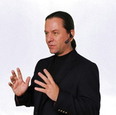“I can control my blood pressure by breathing deeply.” “I can’t believe how much my mood lifts.” “My constipation is gone, after 20 years every thing is regular again!” “I feel a nice warm sensation in my abdomen.” “It’s so calming.” “I love it!” These are some of the things I’ve heard my patients say after practicing qigong exercises. Qigong is the ancient art of health cultivation that has been practiced in China for thousands of years.
Qi Gong and Tai Chi are separated from other forms of exercises because they are slow movements done in a meditative state in co-ordination with breathing. The origins of qigong extend back into antiquity. Qi Gong used to have other names like daoyin and neigong and was practiced in secret by Daoist and Buddhist monks secluded in caves and temples. In modern times the word qigong has been used as a catchall for the various types and styles of qigong. The interesting thing is that qigong exercises are tailor made for cultivating health and even helping with specific health issues. Specific exercises are flexible and can be adjusted to suit any person depending on their state of fitness. Bed ridden patients can be taught simple breathing and meditation exercises to calm their minds, ease their pain, and strengthen their bodies. Trained athletes can use the exercises to increase their focus, enhance their balance, and recruit nerve synapses. Anyone can use qigong as a health maintenance exercise. Even fifteen minutes a day can make a significant difference.
Qigong exercises are the result of thousands of years of obsession with health cultivation and longevity practices. Two thousand–year-old Chinese medicine texts explain very matter-of-factly that the natural life span is one hundred twenty years. The reason we don’t live to that age, they say, is because we fail to follow correct health and lifestyle practices. Qigong was developed as a way to take control of our health processes through simple, but mindful exercise even when our modern lifestyle is hectic and challenging. It’s also peaceful, relaxing, and easy to learn. Some exercises can be learned in a short course or from a video before being practiced at your leisure.
With names like Soaring Crane, Swimming Dragon, and Bone Marrow Washing, qigong exercises can evoke magical, mystical and metaphysical notions, but there is some good science to justify the practice. Studies show that qigong practice can lower blood pressure and reduce the levels of stress hormones like cortisol in the blood stream. Cortisol is the hormone that has been linked to weight-gain, especially abdominal fat. Qi Gong also seems to help with depression.
Taking control of your health requires a little effort and perseverance. With qigong it can be enjoyable and economical, as well as beneficial.
Michael Roland received his Masters degree in Traditional Chinese Medicine in 1993. He worked in Dr. Andrew Weil's Program in Integrative Medicine at the University of Arizona, from 1997 to 2006, as clinician, preceptor, editor and consultant. Michael has written protocols for a studying the effects of Chinese medicine on heart transplant patients for the National Institutes of Health in the United States.
He has also taught clinical practices courses at the Arizona School for Acupuncture and Oriental Medicine. Under his appointment as Clinical Lecturer at the University of Arizona, College of Medicine, he has participated in multidisciplinary training sessions for third and fourth year medical students. Michael has studied under recognized masters in Beijing, PRC and Taiwan.
Michael now practices his disciplines in a remote healing format with clients from around the world. www.MichaelRoland.com

Post new comment
Please Register or Login to post new comment.